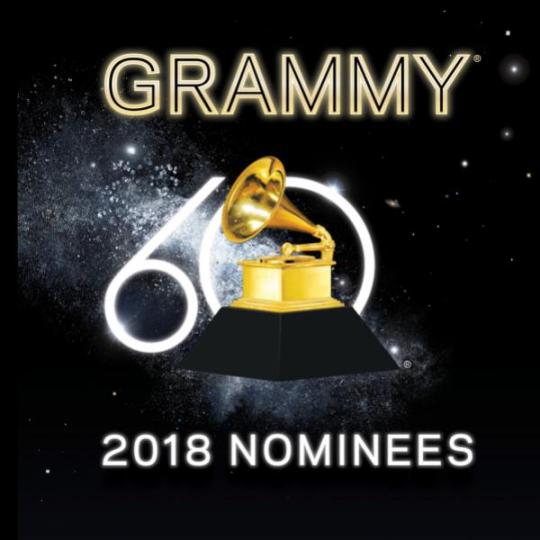#gracecheng

So, the 60th Annual Grammy Nominations were announced yesterday morning, and somehow it left me with more mixed emotions than I’ve felt in a long time. On the one hand, we have many reasons to celebrate this year–the 2018 list of nominees is the most diverse group in all of Grammy history, especially when it comes to Black and LGBTQIA inclusion. Jay-Z, Childish Gambino, Kendrick Lamar, and more were all (deservedly) nominated for record of the year. Kesha and Lady Gaga were both nominated for two Grammys each, and out songwriter Justin Tranter was nominated for his first award as well.
When it comes to inclusion in the entertainment industry, we’ve come a long way, and these nominees are just one example of that. Unfortunately, this progress has not been reflected within the Asian American community, as you can clearly see by the lack of Asian nominees for the 2018 Grammys. I can’t say I’m surprised, considering there aren’t really any huge Asian American names in the music industry. But it’s not because we’re not trying–it’s because those who run the system aren’t listening.This year I got the chance to discover Alice Gao,Niki Zefanya,Yaeji, and several other incredible Asian artists whose music deserves recognition–but none of them are getting the attention they deserve.
While Grammy nomination entries can by submitted by any artists/record companies with commercially released music, all submissions are reviewed by a group of over 350 experts in the fields of jazz, R&B, rock, classical, new age, and more. These experts within the Academy go through several rounds of screening, being advised to vote in up to 15 categories in their areas of expertise as well as the 4 general categories (Record of The Year, Album of the Year, Song of The Year, and Best New Artist). Unfortunately, if you are a lesser known artist in the US (aka most Asian American artists) signed to a label with more well known artists, your label will most likely submit their song/album to be considered for Grammy nomination over yours. At the end of the day, it’s pretty much a self fulfilling prophesy. Since Asian American artists are almost never well known enough to qualify for the final rounds of nomination, their work is not often submitted. As a result, Asian Americans are continuously left out of the mainstream. The whole thing is a cycle that seems to have no end.
Don’t get me wrong, I believe we should celebrate the victories we achieve, but I’m honestly so tired of writing and complaining about Asian American representation. You guys have heard it all before and I’m not here to preach the same message all over again, but my soul is tired y’all. While we should celebrate and cheer on our fellow POC, let’s remember that the entertainment industry is still far, far, from being the all inclusive community that we so desperately need.
Image via grammys.com

You may not have heard of 88Rising, but you’ve probably listened to Dat$tick by Rich Chigga at least once or twice; well, the label behind Rich Chigga’s creative genius is 88Rising, an NYC based music label founded by Sean Miyashiro.
Over the months, 88Rising has gotten more and more spotlight—not only for curating incredible music, but also for giving Asian artists some of the attention they deserve. When Dat $tick went viral, Rich Chigga got the stamp of approval from tons of US rappers, such as Migos, 21 Savage, and more. From there, things have only gone up.
88Rising partnered with The Higher Brothers, a Chengdu based rap group who is breaking barriers in a musical and physical way. Because they don’t have direct access to YouTube in China, they have to work extra hard to interact with their fans, but they do it because it’s all worth it. They have a true appreciation for rap culture that transcends geography and language; for their fans it’s about the flow, the delivery, and the charisma.
88Rising’s Sean manages all of these artists and more, not just because they’re Asian, but because he believes in their music. He told Pitchfork, “Real talk, from a music perspective, if I don’t fuck with it, just ‘cause it’s from the Philippines, I’m not gonna put it up. I think that 1000 percent of the time, the music needs to be good.” And his philosophy shows, too. They recently debuted Indonesian singer NIKI, an R&B artist whose style is characterized by smooth and heavy beats. She’s young, but her potential is definitely there.
In many ways, 88Rising is exactly what the Asian community needs. They obviously want to bring attention to the real talent thats brewing all over Asia, but more than that it’s also about putting out music that’s truly worthwhile. In that way, they’re paving a way for Asian artists to be taken seriously in the music industry. Check out the video below to see some of our favorite rappers reacting to the Higher Brothers and click here to see more of 88Rising’s YouTube content.

The recent film “The Great Wall” starring Matt Damon was released in theaters just a couple of weeks ago, and while I admittedly have not seen the film, the trailer and film poster alone raised a series of red flags and questions in my head. For those who have not heard of the movie, it basically tells the story of a warrior in China who joins a team of elite soldiers to help defend the Great Wall.
I think this film speaks volumes on the state of Hollywood today and also exemplifies exactly what Asian actors are trying so hard to fight against in the entertainment industry - whitewashing and the white savior narrative. The film is directed by one of China’s greatest directors, Zhang Yimou, and features several A-list Chinese celebrities including Andy Lau, Eddie Peng, and Lu Han. Additionally, the film was shot on location in China and supposedly tells the story of China’s might and power. It’s interesting then, to see that Matt Damon is the lead of the film, the “white savior,” and the only person featured on the film’s widely advertised movie poster.
When the film trailer was first released, it immediately sparked outrage, but Matt Damon defended himself by saying that he did not take the role from a Chinese actor, nor was the role altered for him in any way. He also insisted that critics were jumping to conclusions based off of the trailer without having seen the film, and it makes their views less credible. While all of this may be true, it does not change the fact that there is a very obvious placement of a white character where a white character does not belong. Additionally, this character plays the most important role in the film and is highlighted (based on the trailer) as being more essential than the rest of the characters. In fact, Matt Damon is the only actor that has any speaking lines in the entire trailer, even though several other Chinese actors are stated to have leading/crucial roles in the film.
There are so many different elements here that display Hollywood’s rejection of non-white actors and it makes it hard to believe that there has been any progress made. The white savior narrative, the whitewashing, the trailer, the promotional photos, and more, all point to one thing - Hollywood doesn’t believe that Chinese actors are marketable. At the very least, Hollywood believes that White actors are the most marketable, the easiest to sell, and perhaps the easiest to relate to. But this self perpetuating philosophy confines Asians in the entertainment industry and guarantees that no progress can ever be made. People sometimes wonder why so few Asians show up at award ceremonies like the Oscars, but the truth is simply that Asian Americans are never granted the opportunity to play Oscar winning roles because they are too often seen as a “niche” market or as “too exotic” to be front and center.
While minor progress has been made, such as the writing of the film “Crazy Rich Asians” and the popularization of the TV show “Fresh off The Boat,” we have yet to see the integration of the Asian community in the entertainment industry and Asian actors remain very much a niche group. So while hope ultimately prevails, Hollywood still needs to make great strides before genuine diversity can be reached.
If you’re more interested in learning about the Asian American’s role in Hollywood today read this article from the NYT: https://www.nytimes.com/2016/05/29/movies/asian-american-actors-are-fighting-for-visibility-they-will-not-be-ignored.html?_r=0
Matt Damon article: http://www.huffingtonpost.com/entry/matt-damon-wants-you-to-know-he-didnt-steal-a-role-from-a-chinese-actor_us_58473eaee4b0b9feb0da1d06
